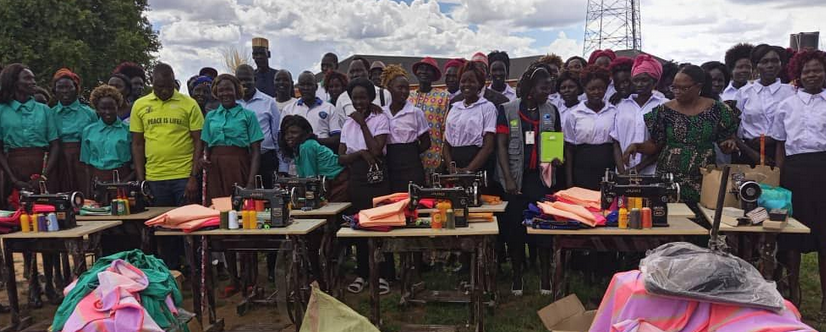The Finn Church Aid (FCA) on Monday successfully graduated 42 female trainees, 18 in tailoring and 24 in hairdressing, during the second phase of training in Mingkaman Town of Awerial County in Lakes State.
This initiative, funded by the Finland foreign ministry, concluded with the participants receiving essential startup kits.
For tailoring, the materials provided included sewing machines, hard poplin, soft poplin, Kitenge fabric, and more. The hairdresser’s startup kits included hand dryers, various types of lotion, weaves, braids, and other related supplies.
A total of 42 women, including internally displaced persons (IDPs) and members of host communities, have been equipped with business startup kits after completing the three-month training program in hairdressing and tailoring.
Notably, Awerial County has promised to allocate land for the construction of a women’s business center for the 40 women who graduated.
The graduation ceremony, which concluded with the distribution of startup kits, was attended by county officials and representatives from both the IDPs and host communities.
Albino Cuei, the Deputy Executive Director of Awerial County, urged Finn Church Aid to continue supporting the women with their newfound skills and confirmed that the county will allocate land near the town for the women to work from.
“This training is immensely beneficial to the vulnerable and motivates women to work hard to provide for their families. It serves as a vital source of income, enabling women to purchase clothing, and food, and even send their children to school. We hope that NGOs will continue their support,” he stated. “As the county authorities, we commit to allocating land and seeking donors to construct suitable facilities for their tailoring and hairdressing businesses.”
He further assured that the government would also ensure security for the women’s businesses and property.
One of the graduates, Mary Ayen Deng, explained that each tailoring machine is shared by two women in a tailoring group and that they have also received kitenge fabric and other essential items to kickstart their businesses.
“We urge Finn Church Aid to persist in their valuable support. We hope to witness more women from both IDPs and host communities acquire skills and knowledge in hairdressing and tailoring,” she emphasized.
Another participant, Mary Akuac Mawut, a tailoring graduate, expressed her immense gratitude to Finn Church Aid for the training and support.
“I am overflowing with joy and gratitude to FCA for their training and support. Now, each one of us has the necessary machines to embark on our businesses. I plan to take my tailoring machine to the market and establish my business,” she beamed while saying. “I have the tailoring skills, and all I require is the means to rent a shop in the market.”
For his part, Andruga Hillary Jacob, a team leader from Finn Church Aid (FCA), announced that a significant group of around 40 women from the IDP camps and host communities, including vulnerable women with disabilities and widows, have successfully graduated with startup kits.
He explained that this is the fifth graduation of the second phase of training in tailoring and hairdressing, with a focus on inclusivity.
“Our target was 42 women, including widows and women with disabilities. In both the tailoring and hairdressing groups, we have included two women with disabilities on both sides,” he noted. “We have provided women in the tailoring group with kitenge fabric and other essential items, while those in the salon group have received mirrors, hairdressers, lotions, and various items to help them start their businesses.”
“Our role is to equip the women with the necessary skills and resources to initiate their businesses,” Andruga added.
He however said it is the responsibility of the women now to acquire land and construct the necessary facilities to house their businesses.




